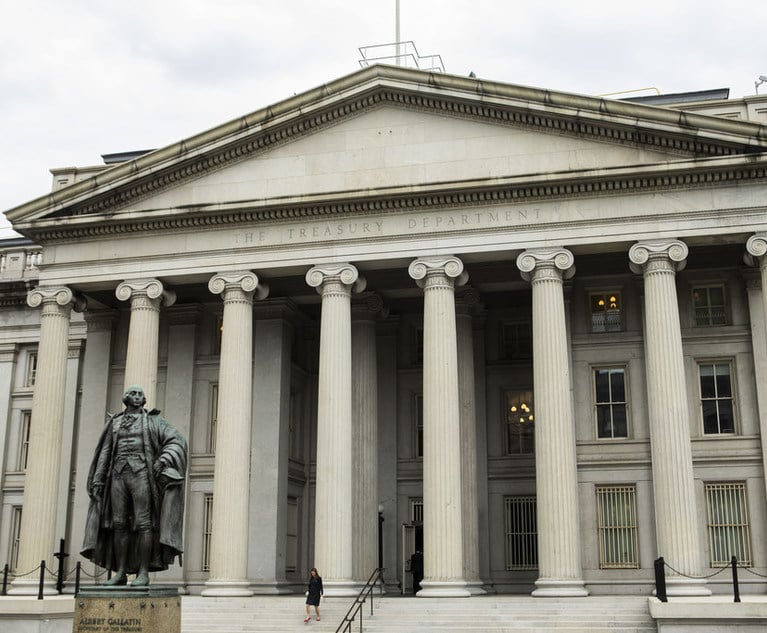Changes anticipated for TV distributors
The leading body for copyright regulations, the U.S Copyright office, has asked Congress to adjust the copyright legislation that currently regulates the course for television distribution. The office proposes that Congress modify the current payment system between cable and satellite operators and rights holders.
August 31, 2011 at 08:12 AM
2 minute read
The original version of this story was published on Law.com
The leading body for copyright regulations, the U.S Copyright office, has asked Congress to adjust the copyright legislation that currently regulates the course for television distribution. The office proposes that Congress modify the current payment system between cable and satellite operators and rights holders.
Instead of the current system, in which operators pay a single, all-inclusive fee for their distribution rights, they would have to negotiate individually with suppliers. This modification, the Copyright office says, will spur dissent from operators that disapprove of the added labor efforts.
The first item expected to change is the legislation surrounding distant-signals. Distributors that currently pay the Copyright Royalty Board for their programming rights would have to discuss individual arrangements with all suppliers that receive their programs, potentially causing payment operations to become more tedious if these distant-signal rules are successfully eliminated. An example of a company that would be significantly affected by the change is Tribune Co. and its WGN station, which is currently managed by multichannel video program distributors.
For more on the possible changes, read coverage from the LA Times.
The leading body for copyright regulations, the U.S Copyright office, has asked Congress to adjust the copyright legislation that currently regulates the course for television distribution. The office proposes that Congress modify the current payment system between cable and satellite operators and rights holders.
Instead of the current system, in which operators pay a single, all-inclusive fee for their distribution rights, they would have to negotiate individually with suppliers. This modification, the Copyright office says, will spur dissent from operators that disapprove of the added labor efforts.
The first item expected to change is the legislation surrounding distant-signals. Distributors that currently pay the Copyright Royalty Board for their programming rights would have to discuss individual arrangements with all suppliers that receive their programs, potentially causing payment operations to become more tedious if these distant-signal rules are successfully eliminated. An example of a company that would be significantly affected by the change is Tribune Co. and its WGN station, which is currently managed by multichannel video program distributors.
For more on the possible changes, read coverage from the LA Times.
This content has been archived. It is available through our partners, LexisNexis® and Bloomberg Law.
To view this content, please continue to their sites.
Not a Lexis Subscriber?
Subscribe Now
Not a Bloomberg Law Subscriber?
Subscribe Now
NOT FOR REPRINT
© 2025 ALM Global, LLC, All Rights Reserved. Request academic re-use from www.copyright.com. All other uses, submit a request to [email protected]. For more information visit Asset & Logo Licensing.
You Might Like
View All
Internal Whistleblowing Surged Globally in 2024, So Why Were US Numbers Flat?
6 minute read
FTC Finalizes Child Online Privacy Rule Updates, But Ferguson Eyes Further Changes

Supreme Court Reinstates Corporate Disclosure Law Pending Challenge
Trending Stories
Who Got The Work
J. Brugh Lower of Gibbons has entered an appearance for industrial equipment supplier Devco Corporation in a pending trademark infringement lawsuit. The suit, accusing the defendant of selling knock-off Graco products, was filed Dec. 18 in New Jersey District Court by Rivkin Radler on behalf of Graco Inc. and Graco Minnesota. The case, assigned to U.S. District Judge Zahid N. Quraishi, is 3:24-cv-11294, Graco Inc. et al v. Devco Corporation.
Who Got The Work
Rebecca Maller-Stein and Kent A. Yalowitz of Arnold & Porter Kaye Scholer have entered their appearances for Hanaco Venture Capital and its executives, Lior Prosor and David Frankel, in a pending securities lawsuit. The action, filed on Dec. 24 in New York Southern District Court by Zell, Aron & Co. on behalf of Goldeneye Advisors, accuses the defendants of negligently and fraudulently managing the plaintiff's $1 million investment. The case, assigned to U.S. District Judge Vernon S. Broderick, is 1:24-cv-09918, Goldeneye Advisors, LLC v. Hanaco Venture Capital, Ltd. et al.
Who Got The Work
Attorneys from A&O Shearman has stepped in as defense counsel for Toronto-Dominion Bank and other defendants in a pending securities class action. The suit, filed Dec. 11 in New York Southern District Court by Bleichmar Fonti & Auld, accuses the defendants of concealing the bank's 'pervasive' deficiencies in regards to its compliance with the Bank Secrecy Act and the quality of its anti-money laundering controls. The case, assigned to U.S. District Judge Arun Subramanian, is 1:24-cv-09445, Gonzalez v. The Toronto-Dominion Bank et al.
Who Got The Work
Crown Castle International, a Pennsylvania company providing shared communications infrastructure, has turned to Luke D. Wolf of Gordon Rees Scully Mansukhani to fend off a pending breach-of-contract lawsuit. The court action, filed Nov. 25 in Michigan Eastern District Court by Hooper Hathaway PC on behalf of The Town Residences LLC, accuses Crown Castle of failing to transfer approximately $30,000 in utility payments from T-Mobile in breach of a roof-top lease and assignment agreement. The case, assigned to U.S. District Judge Susan K. Declercq, is 2:24-cv-13131, The Town Residences LLC v. T-Mobile US, Inc. et al.
Who Got The Work
Wilfred P. Coronato and Daniel M. Schwartz of McCarter & English have stepped in as defense counsel to Electrolux Home Products Inc. in a pending product liability lawsuit. The court action, filed Nov. 26 in New York Eastern District Court by Poulos Lopiccolo PC and Nagel Rice LLP on behalf of David Stern, alleges that the defendant's refrigerators’ drawers and shelving repeatedly break and fall apart within months after purchase. The case, assigned to U.S. District Judge Joan M. Azrack, is 2:24-cv-08204, Stern v. Electrolux Home Products, Inc.
Featured Firms
Law Offices of Gary Martin Hays & Associates, P.C.
(470) 294-1674
Law Offices of Mark E. Salomone
(857) 444-6468
Smith & Hassler
(713) 739-1250







